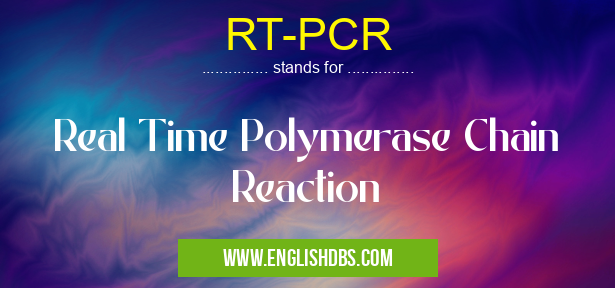What does RT-PCR mean in BIOLOGY
RT-PCR (Real-Time Polymerase Chain Reaction) is a widely used molecular biology technique for amplifying and quantifying specific DNA or RNA sequences. It is a variation of the traditional polymerase chain reaction (PCR) method, with the key difference being that it allows for real-time monitoring of the amplification process.

RT-PCR meaning in Biology in Academic & Science
RT-PCR mostly used in an acronym Biology in Category Academic & Science that means Real Time Polymerase Chain Reaction
Shorthand: RT-PCR,
Full Form: Real Time Polymerase Chain Reaction
For more information of "Real Time Polymerase Chain Reaction", see the section below.
RT-PCR Principle
The RT-PCR process involves several steps:
- Sample preparation: The target DNA or RNA is extracted from a biological sample.
- Reverse transcription (RT): If the target is RNA, it is converted into complementary DNA (cDNA) using reverse transcriptase enzyme.
- PCR amplification: The specific DNA or cDNA sequence is amplified using a heat-stable DNA polymerase enzyme and specific primers. The reaction is carried out in cycles, with each cycle consisting of denaturation, annealing, and extension steps.
- Real-time detection: During each cycle, fluorescent probes or dyes are used to measure the amount of amplified product in real time. This allows for continuous monitoring of the amplification process.
Types of RT-PCR
- Quantitative RT-PCR (qPCR): Used to determine the absolute or relative quantity of specific DNA or RNA molecules in a sample.
- Semi-quantitative RT-PCR: Used to compare the expression levels of multiple genes or samples, but does not provide absolute quantification.
- Reverse Transcription RT-PCR: Specifically used to amplify and quantify RNA molecules.
Applications of RT-PCR
RT-PCR has a wide range of applications in various fields, including:
- Molecular diagnostics: Detecting and quantifying pathogens for infectious disease diagnosis.
- Gene expression analysis: Studying the expression levels of genes in different tissues or under different conditions.
- Cancer research: Identifying genetic mutations and assessing disease progression.
- Forensic science: Identifying individuals through DNA profiling.
- Environmental monitoring: Detecting and quantifying pollutants in the environment.
Essential Questions and Answers on Real Time Polymerase Chain Reaction in "SCIENCE»BIOLOGY"
What is RT-PCR?
RT-PCR stands for Real Time Polymerase Chain Reaction. It is a molecular biology technique used to amplify and detect specific DNA or RNA sequences. It is commonly used to diagnose infectious diseases by detecting the presence of a pathogen's genetic material.
How does RT-PCR work?
RT-PCR involves a series of temperature cycles to amplify a specific DNA or RNA sequence. The reaction mixture contains the target DNA or RNA, primers (short DNA sequences complementary to the target), DNA polymerase enzyme, and fluorescent probes. During each cycle, the temperature is raised to separate the DNA strands and then lowered to allow the primers to bind to the target sequence. The DNA polymerase then synthesizes new complementary DNA strands, resulting in exponential amplification of the target sequence. The fluorescent probes emit a signal when they bind to the amplified target, allowing real-time monitoring of the reaction.
What is RT-PCR used for?
RT-PCR is primarily used for:
- Diagnosing infectious diseases: Detecting the presence of specific pathogens, such as bacteria, viruses, or parasites.
- Quantifying gene expression: Measuring the amount of specific RNA transcripts in a sample.
- Genetic testing: Identifying mutations or variations in DNA sequences associated with diseases or genetic disorders.
Is RT-PCR an accurate test?
RT-PCR is generally a highly accurate test. However, the accuracy can be affected by factors such as:
- Sample quality: Poor-quality samples may contain contaminants or degraded nucleic acids.
- Reaction conditions: Improper temperature or reagent concentrations can affect the amplification efficiency.
- Interpretation: The results must be interpreted carefully to avoid false positives or false negatives.
What are the advantages of RT-PCR?
Advantages of RT-PCR include:
- Sensitivity: Can detect very small amounts of target DNA or RNA.
- Specificity: Amplifies and detects specific sequences, minimizing cross-reactivity.
- Real-time monitoring: Allows for real-time quantification of the amplified product.
- Versatility: Can be used for a wide range of applications, including diagnostics, research, and genetic testing.
Final Words: RT-PCR is a powerful molecular biology technique that enables real-time monitoring of DNA or RNA amplification. It provides valuable insights into gene expression, pathogen detection, and various other applications in research, diagnostics, and forensics.
